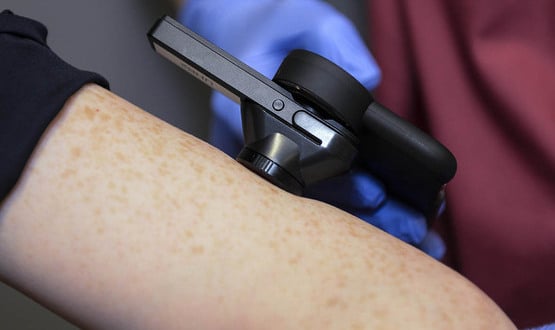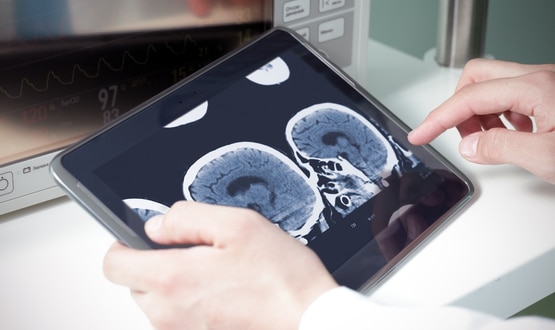Skin Analytics looks to remap patient pathways for cancer diagnoses
- 14 November 2023

Fresh off a Digital Health Hub award at the HLTH annual conference in Las Vegas in October, AI dermatology company Skin Analytics is aiming to build on its position as the only holder of a Class IIa medical device in the UK to rebuild patient pathways in the country and improve outcomes.
With the NHS hampered by a shortage of dermatologists, only 35% of NHS trusts are currently seeing patients within 14 days. Skin Analytics’ AI medical device DERM has demonstrated its potential to reduce waiting times and improve patient outcomes.
“We’ve built AI as a medical device that is able to look at dermoscopic images of skin lesions and identify malignant, pre-malignant and benign lesions,” says Skin Analytics CEO and founder Neil Daly in an interview with Digital Health News.
“This is allowing us to work with NHS partners and build patient pathways so that when patients come in, we can more efficiently route them to the right person.”
DERM analyses skin lesions to help doctors find cancers at an early stage. In a review of over 10,000 lesions seen in the last year, DERM identified 98.7% of cancers, including melanoma and squamous cell carcinoma, while also identifying over seven out of every 10 benign lesions that do not require specialist input.
Using technology to help streamline pathways
Skin Analytics is currently deployed across 11 secondary care sites in the NHS, determining which patients referred on the urgent skin cancer pathway require hospital input, says Daly, who is also a fellow at the National Innovation Accelerator.
Commercial deployments of the technology include Chelsea and Westminster Hospital, University Hospitals Leicester and University Hospitals Birmingham. It is also being used in pilot projects in trusts including Royal Devon University Healthcare and Mid-Cheshire Hospitals as part of the company’s AI in Health and Care award.
In four sites in primary care the company is operating pilot projects with the national cancer programme, to which patients are referred first. They have an initial assessment done by AI that determines their subsequent route on the patient pathway. These SBRI Pre-GP pathway trials in Suffolk and Northeast Essex, Hereford & Worcester and Lancashire and South Cumbria ICB.
“If we can show the sort of health economic value, as well as prove its safety, like we’ve done many times before, this model might be more efficient for the NHS long term,” Daly said.
Since 2020, Skin Analytics have seen some 70,000 patients so far and detected more than 7000 cancers, using the company’s technology, which allows images to be captured by a smartphone with a dermoscope attached to it.
“The benefits that accrue to the health system are always difficult to unpick, but we are able to see that a number of our partners have been able to meet the now defunct two-week wait targets for quarter after quarter, after working with us,” Daly added.
Skin Analytics is currently the only company with a Class IIa medical device cleared by the UK; other companies have yet to get past that initial challenge of developing AI and bring it to a medical grade device.
NHS remains focus of future strategy
“We get told, as all small companies of our size do, that you have to think about the US, you have to think about Europe and expand,” Daly said. “We’re so committed to making sure that the NHS works. And because it aligns with what were trying to achieve as a company, our mission has always been to help more people survive skin cancer.
“And the only way that I think you can do that is by making access to skin cancer assessments so easy and so relatively cheap that everyone can get them when they want to.”
In the future, Daly said, there is the possibility of using DERM’s technology in the NHS without a referral, although he acknowledged that the company needs to proceed extremely cautiously.
Skin Analytics takes seriously its obligation to make its service part of the existing clinical process, he says. This means that any suspected case of cancer would have to be communicated “very carefully” to patients.
Daly added: “The second thing you need to make sure is that the next step for that patient is really clear and there’s no way they can drop off that pathway.”
“We want to operate within the health system, and I think that’s sort of a stepwise process,” he said. “If we deploy in the community, it has the definite benefit of being able to assess more people, and that would find more cancers and there would be better potential outcomes. Ultimately, we think that would generate cost savings.”



